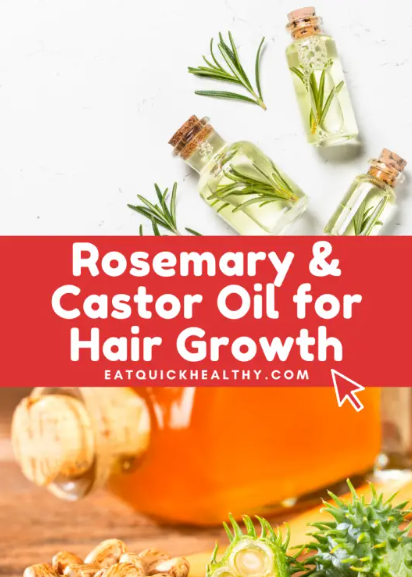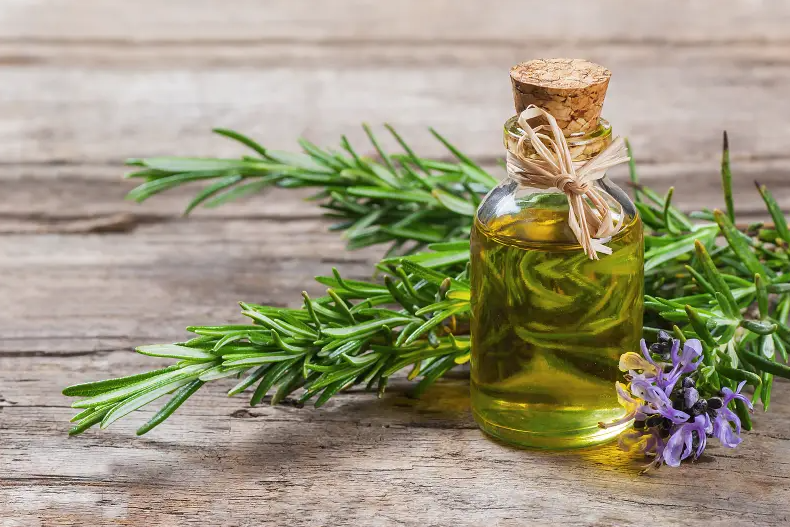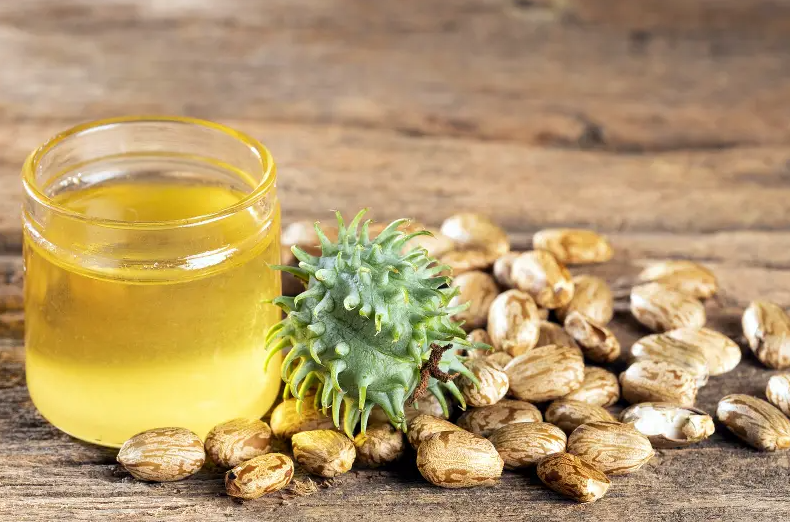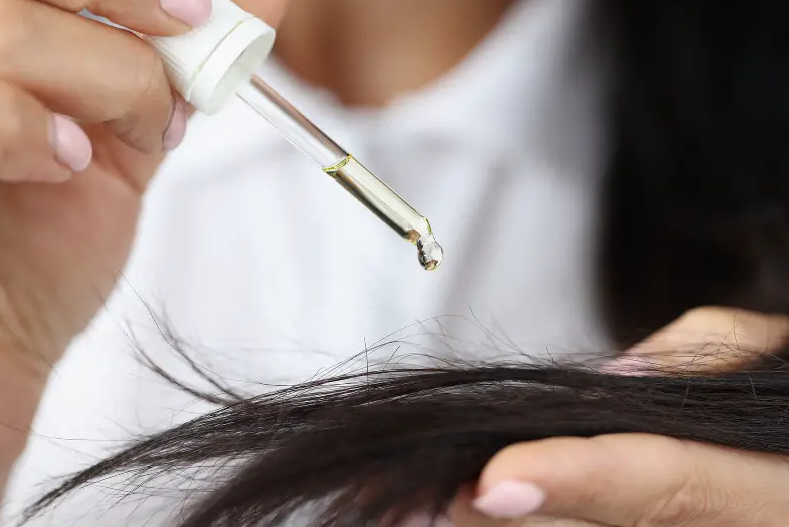Using rosemary oil and castor oil for hair growth is a great way for boosting your hair health. Having healthy hair is a growing concern for most people, especially women. They want their hair to have a bright shine and thick volume. But inorganic foods with added preservatives and hair coloring chemicals harm hair health.
That is why hair requires extra care, attention, and lots of LOVE!
For better hair health and increased hair growth, we have to switch towards natural products that stimulate hair follicles to grow thick and shiny.
And two such products are rosemary oil and castor oil.
Rosemary oil and castor oil are great products for your physical and mental health. They can help with minor health issues, improve mood, and make your hair healthier.
Many people who use these oils are familiar with their benefits for hair health. But studies suggest that the two oils might give even better results when combined.
Read below to find out more about rosemary oil and castor oil and how they benefit your hair. Continue reading to learn the best ways to use the two hair oils for great hair health.
Click here to buy a beneficial rosemary and castor oil solution for your hair.

What Is Rosemary Oil?
Rosemary oil is extracted from the Rosemary herb or Rosmarinus officinalis. This sweet-smelling herb is a small evergreen plant that also includes herbs like lavender, peppermint, sage, and basil. This herb can be used in cooking, as decoration, as a cosmetic, and as medicine.
Rosemary oil has been in use for centuries. It has long been considered a useful herb among the Greeks, Egyptians, and Romans. Its usefulness was documented in the 16th century when Paracelsus, a German-Swiss physician, realized its ability to strengthen the body.
Many people use rosemary oil to improve their hair and skin. It has a high amount of antioxidants which has positive impacts on the human body and mind. It can improve memory, boost the liver, lower cortisol levels, and even help fight cancer.
Click here to buy rosemary oil or see the latest prices.
What Are The Benefits Of Using Rosemary Oil On Your Hair?

Rosemary Oil is known for its ability to help you have healthier hair. Here are some of
the benefits of using it regularly on your hair:
It Can Heal Your Scalp
Rosemary Oil has anti-inflammatory properties that can help heal the skin of the scalp. It also improves circulation in the scalp by dilating the blood vessels, allowing for better blood flow into the scalp. When the scalp has better blood flow, the hair can take up more nutrients from the blood to stay healthy.
Rosemary Oil also improves oxygen transport throughout the body, especially the scalp. This helps the scalp remain healthy, boosting your hair health.
When hair does not get enough oxygen and nutrients from the blood, it can result in hair loss or thinning. Therefore, using rosemary oil can reduce hair loss, giving your hair a better volume.
It Can Strengthen Hair
Using rosemary oil frequently will give your hair a softer and shinier feel. You’ll also find them thicker than before. This is due to rosemary’s properties of hair protection, making hair breakage less likely.
Rosemary Oil works like magic on the scalp to promote hair health and reduce hair loss and dullness.
Hair loss often occurs from damage and breakage, eczema or psoriasis, inflammation, or chemotherapy treatments. But with rosemary oil, you’ll find your hair in better health than before!
It Can Help with Itching & Irritation
Rosemary oil has anti-inflammatory properties along with the ingredient carnosic acid. They combine to heal the skin and tissues of the scalp, relieving irritation and itching. So get ready to say goodbye to a dry and itchy scalp!
Rosemary oil has anti-bacterial and anti-fungal properties and can also be used to treat dandruff which often has the symptoms of itching, irritation, and a white scalp.
Thus, rosemary oil also prevents infections in the scalp and treats the symptoms associated with it.
Click here to buy rosemary oil.
What Is Castor Oil?
Castor oil is extracted from the seeds of the castor bean plant. The plants are native to Africa’s warm and tropical land.
It has been used for thousands of years as a natural treatment for constipation and healing wounds. To learn more about castor oil and how it helps the body, check out this article.
What Are The Benefits Of Using Castor Oil In Your Hair?

Castor oil nourishes your hair to the roots and seals moisture in your scalp to make your hair shinier, healthier, and thicker. Here are some more benefits of using castor oil in your hair.
It Helps With An Itchy Scalp
Like rosemary oil, castor oil is effective at treating the symptoms of itchiness and irritation. Castor oil is very thick, which allows it to penetrate the scalp. Therefore, it can keep the scalp moisturized, reducing the presence of dandruff and the feelings of itchiness and irritation.
Less dandruff means you can play with your hair and style them without feeling annoyed by constant itchiness!
It Can Prevent Infection and Reduce Hair Loss
Castor oil has antibacterial, antifungal, and antioxidant properties that reduce hair loss. It also prevents your scalp from developing an infection and helps treat the symptoms of infection, including itchiness and irritation. This is especially important for people with a scalp more prone to dryness and dandruff.
It Strengthens & Repairs Hair
Castor Oil has many essential vitamins and nutrients which are great for strengthening hair from the roots. It also contains vitamin E and fatty acids which reduce inflammation.
Not only does inflammation reduce itchiness, dandruff, and a host of other issues, but it makes hair healthier and stronger too. The nutrients improve blood circulation in the scalp, strengthening the hair follicles.
Castor oil also maintains and restores your scalp’s natural pH as it has the same pH as a healthy scalp. So using castor oil in your hair can bring back its natural glow and health by penetrating well into the skin.
Should You Apply Rosemary Oil and Castor Oil for Hair Growth? Does It Work?
Rosemary Oil resolves several issues associated with hair, including dandruff, hair loss, itchiness, and irritation. However, there is not enough scientific evidence to suggest that rosemary oil will promote hair growth.
Some studies performed on Rosemary Oil’s effectiveness for hair growth are discussed
below.
Rosemary Oil
Study #1
Doctor Markowitz of OptiSkin in New York City says that studies show that rosemary oil can be effective for hair growth. In 2015, studies performed on humans with androgenetic alopecia relied on the comparative effects of rosemary oil and minoxidil.
The results showed that the rosemary oil was as effective as minoxidil in hair growth. It even helped treat the side effects of alopecia better than minoxidil.
Dr. Shamban of AVA MD Dermatology says that patients have reported seeing more hair growth after using rosemary oil. She believes it helps prevent hair loss from alopecia areata the best, but it can also treat other hair loss issues.
Study #2
Another study was performed with rosemary leaf extract on mice. The extract stimulated hair growth in mice whose hair loss was caused by testosterone (pattern baldness).
This may suggest that rosemary oil would promote hair growth in men too.
Study #3
Another study suggests that rosemary oil can help heal nerve tissue. Rosemary oil contains carnosic acid, which heals and rejuvenates nerve endings in the scalp. Researchers believe that this healing could also promote new hair growth.
Thus, the possibility of rosemary oil promoting hair growth is highly likely. Nevertheless, it cannot be denied that rosemary oil works like a healing potion for your weak, dead, and nutrient-deficient hair. It deeply moves into the scalp to bring lasting effects to your hair follicles – from roots to ends.
Castor Oil
There have not been as many studies on castor oil to know if it helps promote hair growth. However, it can certainly help your hair become healthier, shinier, and stronger.
But which is better? Castor oil or Rosemary oil?
Both oils are highly effective for treating hair infection symptoms and hair loss issues. So when castor oil and rosemary oil are combined, they improve your hair and scalp health significantly. Once mixed, they will make your hair significantly healthier and happier. You’ll get compliments from friends and family about your hair’s lovely shine and strength. You’ll also feel more confident due to the naturally-enhanced look of your hair all thanks to this magical hair oil mixture!
How To Use Rosemary Oil and Castor Oil Mix For Hair Health and Growth?

There are many different ways to combine rosemary and castor oil to boost your scalp health. Here are a few methods and recipes to help you get started.
Homemade Rosemary Oil and Castor Oil Mixture for Hair Health
Your hair deserves the best treatment, so caring for it with a homemade mixture of natural oils will be good for it. All you need are two teaspoons of castor oil, two teaspoons of coconut oil, and 2-3 drops of rosemary essential oil.
Method
- Take a bowl and mix castor and coconut oil in it. Heat the mixture until blended.
- Add the drops of rosemary essential oil into the blend.
- Take this hot oil mixture and massage your scalp and hair with it. Continue massaging well for 5-10 minutes. The hot oil mixture will make your hair shine and move the nutrients deep into the roots.
- Keep the oil in your hair for 15 more minutes.
- Wash your hair with a mild shampoo.
- Continue this treatment every week for some months. You’ll notice a glorious luster in your hair like never before!
Apply The Oils with A Special Solution
You can buy a special hair solution with rosemary and castor oils to apply to your hair quickly and easily. Buying a special hair solution saves you time as you do not have to prepare the individual ingredients and simply have to apply the readymade solution.
Add The Oils Directly to Your Shampoo
If you are someone with a strict routine and less time for hair care, this is certainly the easiest method for you. You can use whichever shampoo you usually use and add a few drops of rosemary and castor oil to the bottle.
Make sure that you thoroughly shake and mix the shampoo, and then continue to use it as normal.
Turn The Oils Into A Hair Spray
If you do not enjoy the thickness of hair oils, you can always create a spray. To create the spray, you only have to mix a few ingredients. See the recipe below.
Ingredients:
- 2 tablespoons rosemary oil
- 2 tablespoons castor oil
- 1 cup water
- 1-2 teaspoons vegetable glycerin (optional, for added moisture)
- 5-10 drops of essential oil of your choice (optional, for fragrance)
Instructions:
- In a small bowl, combine the rosemary oil and castor oil.
- If using vegetable glycerin, add it to the oils and mix well.
- In a separate saucepan, bring the water to a boil.
- Once the water reaches a boil, remove it from the heat and let it cool for a few minutes.
- Slowly pour the warm water into the bowl with the oils and glycerin, stirring continuously.
- If using essential oil for fragrance, add a few drops to the mixture and stir well.
- Allow the mixture to cool completely.
- Transfer the hair spray mixture into a spray bottle.
You can then spray the mixture over your hair and leave it. It will benefit your hair greatly if you apply the solution at bedtime and rinse it in the morning.
If you’d not like to wait till morning to rinse it, let it sit for 5-10 minutes to get effective results.
Massage The Oils Directly Into Your Scalp
Massaging the oils into your scalp brings you the goodness of the two oils in the best form. The most effective method of applying the oils to your scalp is doing it after a shower when your hair is already wet.
The two oils are quite strong and can be a bit irritating on their own. Therefore, mix the oils into a carrier oil such as coconut, argan, or jojoba oil before massaging it into your scalp.
You can also leave the mixture in your hair as a leave-in condition or you can rise it out 5-10 minutes after massaging it well into your scalp and hair.
If you’d like, you can leave the mixture in your hair as a leave-in conditioner. You can also rinse it out 5-10 minutes after adding it to your hair and scalp.
Rosemary And Castor Oil For Hair Growth — Earthy Scent Recipe
Ingredients:
- 1/2 cup Castor Oil
- 6-8 drops Rosemary Oil
- 3-5 drops of Lavender Oil
- 1 tablespoon Carrier Oil
Tropical Scent
Ingredients:
- 1/2 cup Castor Oil
- 6-8 drops Rosemary Oil
- 3-5 drops of Grapefruit Oil
- 1 tablespoon Coconut Oil
Fresh Scent
Ingredients:
- 1/2 cup Castor Oil
- 6-8 drops Rosemary Oil
- 1-3 drops Peppermint Oil
- 1-3 drops of Tea Tree Oil
- 1 tablespoon Almond Oil
For all three of these recipes, you can simply follow the above directions to massage the mixtures into your scalp.
Click here to buy castor oil or here for rosemary oil.
You can also buy a rosemary and castor oil solution to enjoy all the benefits that come with this magical oil mixture. Click here for some options.
Conclusion
Rosemary Oil and Castor Oil for hair growth are individually known to contain properties and ingredients that help with hair shine and strength, reducing itchiness, irritation, and other symptoms of infection. These oils help with blood circulation to the scalp, making it healthier.
When these two oils are combined, they bring forth a hair-friendly mixture that boosts hair health, making your hair happier and stronger.
But don’t forget to sleep well and eat healthy and nutritious food because strong hair needs you to take care of your mental and physical health.
So invest in your hair health today!
Learn more ways to improve your hair with castor oil with our full guide to using castor oil with aloe vera on your hair here or using castor oil with tea tree oil here or castor oil with lavender oil here. Find all our guides to using castor oil here.

![Boost Your Hair Health: How To Use Rosemary Oil And Castor Oil For Hair Growth [Full Guide] rosemary oil and castor oil for hair growth](https://eatquickhealthy.com/wp-content/uploads/2022/03/castor-oil-in-hair-768x513.jpg)

Comments are closed.